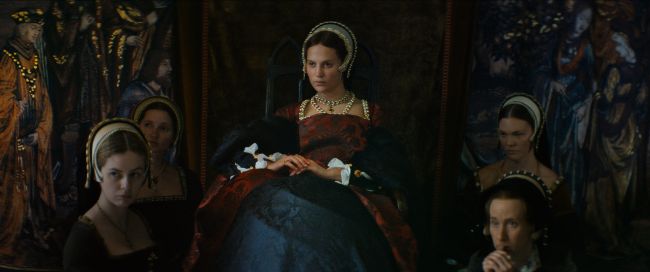Cannes: Tudor Costume Drama “Firebrand” Does Big Business
- SUBSCRIBE
- ALREADY SUBSCRIBED?
BECOME A BONJOUR PARIS MEMBER
Gain full access to our collection of over 5,000 articles and bring the City of Light into your life. Just 60 USD per year.
Find out why you should become a member here.
Sign in
Fill in your credentials below.
Brazilian filmmaker Karim Aïnouz’s English language debut and British historical epic, Firebrand, premiered at the Cannes Film Festival starring Alicia Vikander as Catherine Parr and a nearly unrecognizable Jude Law playing King Henry VIII. The film is adapted from the 2013 novel Queen’s Gambit by Elizabeth Fremantle.
Ahead of its premiere, the historical drama already made headlines that it sold out internationally; eager distributors snapped up the rights to this film. Variety reported that the film sold streaming rights to Amazon’s Prime Video in the UK, and it sold to Sony Pictures for most other international markets. Any film that premieres at Cannes is hoping for – if it doesn’t already have one – a lucrative distribution deal like the kind Firebrand already secured ahead of its premiere. And it’s easy to see why it’s been such a buzzy title at the festival.
Firstly, it’s gorgeously made. The audience is transported in time, back to a blood-soaked Tudor England with lavish costumes. This film was shot at Haddon Hall in Derbyshire, England, a former medieval manor with origins that date back to the 11th century. The authenticity of the set and the costumes make for a time-travel-like experience when watching the film.
Catherine Parr (Vikander) is named Regent as her husband, the king (Jude Law), fights overseas. When King Henry VIII returns, he is even more unhinged and tyrannical than before. He’s suspicious and paranoid, and he’s furious with Catherine for pushing for a new future backed by her “radical” Protestant beliefs. Henry grows suspicious of her involvement with a childhood friend and Protestant preacher, Anne Askew, and burns the friend at the stake after charging her with treason.
Married in July 1543, Catherine and Henry’s relationship is uncomfortable at best and abusive at worst. She knows she’s just one of many women in the long line of Henry’s wives (she’s the sixth and final wife). Catherine wonders if she’ll be beheaded or burned at the stake, too. Her husband eventually accuses her of heresy.
Meanwhile, Catherine has a secret relationship of sorts with Thomas Seymour, 1st Baron Seymour of Sudeley. (Eventually, after Henry’s death, the history books tell us that they finally are able to marry, and later they have a child, Mary Seymour.) In the film, Thomas betrays Catherine to show loyalty to the king in order to spare the life of him and his brother.
This gripping historical drama, full of suspense and danger, left audiences at Cannes riveted. At its premiere, the film and its cast and director received a whopping 8-minute-long standing ovation. Vikander’s husband, actor Michael Fassbender, beamed as he looked on, supporting his spouse from a row inside the theater.
Vikander and Law received warranted adulation from the Cannes crowds. Law was adept at playing a totally unhinged and cruel king, and his physical transformation for the role (heavier, world-weary) made him barely recognizable.
Speaking with Variety, Vikander said of this intriguing role and character, Catherine Parr, “What’s mostly been dramatized are the wives who didn’t make it. [When I read the script] I immediately thought, ‘Hugh, isn’t it interesting that most people know more about the other wives.’ It’s almost like people are drawn to quite grim stories.”
Grim indeed. Tudor England was a grim time for women, and grim for people, in general. There’s little glamour found in this historical drama, and Vikander says that’s part of what drew her to it. She told Variety “[The film] made us want to strip back and make something that feels very raw and authentic. I loved that [director Karim Aïnouz] wanted to undress the costume drama.”
Vikander’s performance as Catherine Parr was showstopping. She brought exquisite rage to the role of a suppressed woman who’s fed up, forced to hide her desires, and forbidden to follow her heart. That she triumphs, in the end, makes this dark, pseudo-Cinderella story feel like an offbeat – and depressing – fairy tale from once upon a tragic Tudor time.
Lead photo credit : Still from "Firebrand." courtesy of Festival de Cannes
More in Cannes, Cannes film festival, movies





